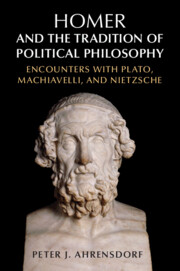
- Publisher:
- Cambridge University Press
- Online publication date:
- August 2022
- Print publication year:
- 2022
- Online ISBN:
- 9781316417591

In this book, Peter Ahrensdorf explores an overlooked but crucial role that Homer played in the thought of Plato, Machiavelli, and Nietzsche concerning, notably, the relationship between politics, religion, and philosophy; and in their debates about human nature, morality, the proper education for human excellence, and the best way of life. By studying Homer in conjunction with these three political philosophers, Ahrensdorf demonstrates that Homer was himself a philosophical thinker and educator. He presents the full force of Plato's critique of Homer and the paramount significance of Plato's achievement in winning honor for philosophy. Ahrensdorf also makes possible an appreciation of the powerful concerns expressed by Machiavelli and Nietzsche regarding that achievement. By uncovering and bringing to life the rich philosophic conversation among these four foundational thinkers, Ahrensdorf shows that there are many ways of living a philosophic life. His book broadens and deepens our understanding of what a philosopher is.
‘Ahrensdorf’s study not only explores the extraordinary influence of Homer in the tradition of Western philosophy, but it also now illuminates the ways in which Homer challenges three of the most powerful minds in that tradition, and us, to examine the question of philosophy itself … Among Ahrensdorf’s great virtues as a writer is his exceptional attentiveness to textual detail, capacity to draw out the human meaning of the texts, and ability to richly imagine the characters that people them. His work marries these qualities with a focus on the most fundamental human concerns, treating them with the gravity they demand and the levity they occasionally evoke. Scholars may quarrel with his arguments or conclusions, but none will doubt the perspicacity of his understanding of the most serious questions of human concern.’
Susan Collins - Associate Professor of Political Science, University of Notre Dame
‘… this is a challenging reimagining of the relationships between key thinkers in the tradition of political thought. Taken together, these interpretations make for a very good volume and one that will likely be a valued contribution to the field of political theory and literature.’
Seaver Holter Source: The Review of Politics
 Loading metrics...
Loading metrics...
* Views captured on Cambridge Core between #date#. This data will be updated every 24 hours.
Usage data cannot currently be displayed.